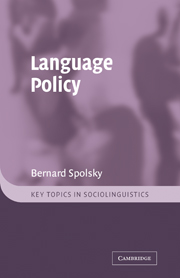Book contents
- Frontmatter
- Contents
- List of tables
- Preface
- 1 Language practices, ideology and beliefs, and management and planning
- 2 Driving out the bad
- 3 Pursuing the good and dealing with the new
- 4 The nature of language policy and its domains
- 5 Two monolingual polities – Iceland and France
- 6 How English spread
- 7 Does the US have a language policy or just civil rights?
- 8 Language rights
- 9 Monolingual polities under pressure
- 10 Monolingual polities with recognized linguistic minorities
- 11 Partitioning language space – two, three, many
- 12 Resisting language shift
- 13 Conclusions
- References
- Index
10 - Monolingual polities with recognized linguistic minorities
Published online by Cambridge University Press: 22 December 2009
- Frontmatter
- Contents
- List of tables
- Preface
- 1 Language practices, ideology and beliefs, and management and planning
- 2 Driving out the bad
- 3 Pursuing the good and dealing with the new
- 4 The nature of language policy and its domains
- 5 Two monolingual polities – Iceland and France
- 6 How English spread
- 7 Does the US have a language policy or just civil rights?
- 8 Language rights
- 9 Monolingual polities under pressure
- 10 Monolingual polities with recognized linguistic minorities
- 11 Partitioning language space – two, three, many
- 12 Resisting language shift
- 13 Conclusions
- References
- Index
Summary
MORE THAN MONOLINGUAL?
The countries listed in table 2 are similar to those in ch. 9 in that they name one language in their constitution, but are differentiated from them by constitutional recognition also of the rights of minorities.
In many cases, the constitutional proclamation of a single state or national or official language is followed by a qualifying statement to do with the linguistic rights of recognized minorities. Many of them take this extra qualification from some earlier constitution (in former Soviet republics, for instance). Others are influenced by the movement towards the recognition of rights of linguistic minorities.
A number of Latin American countries appear on this list: Brazil, Colombia, Ecuador, El Salvador, Guatemala, Nicaragua, Panama, Peru and Venezuela. In each case, the constitution proclaims Spanish (or, in the case of Brazil, Portuguese) as the official language, but adds, in more recent versions at least, recognition and protection for indigenous native languages and dialects. About 10 percent of the Latin American population (about 40 million people) is classifiable as indigenous, usually on the basis of language, self-perception and geographical concentration (World Bank 1993). These criteria are far from precise. Many different languages are involved: only Uruguay is monolingual, and other countries have from 7 to 200 indigenous languages. Indigenous people are in an inferior social and economic position and are commonly illiterate. Recently, there has been increasing recognition of the problem, and a number of changes have been made in language policy to deal with the issues.
Information
- Type
- Chapter
- Information
- Language Policy , pp. 143 - 160Publisher: Cambridge University PressPrint publication year: 2003
